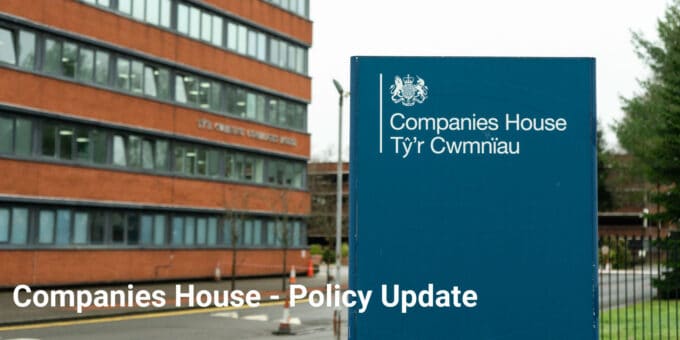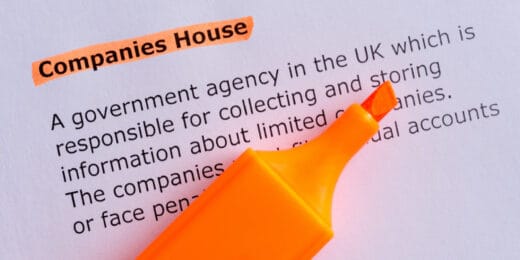Companies House announced yesterday they will no longer accept any minutes containing resolutions that companies submit to them. This change in policy is likely to impact many companies when they are fulfilling their submissions to Companies House, as required.
In this blog, we’ll explain what exactly these changes are and how they will impact you.
Key Takeaways
- Companies must now submit special resolutions separately, avoiding the inclusion of general meeting minutes to comply with regulations.
- Failure to submit resolutions within 15 days may result in legal consequences for both the company and its officers.
- Companies House aims to enhance corporate transparency and integrity by rejecting unnecessary information in submitted documents.
What does the legislation say?
Firstly, let’s talk about company filings. Every company registered in the UK is required to submit a number of filings to Companies House, the Registrar of Companies. These filings can be routine ones, such as the annual confirmation statement or annual accounts.
Other submissions might be on an ad hoc basis, only needed when a certain change takes place. An example of this might be when a company changes its registered office, in which case you will need to submit an AD01 Form.
One key requirement that all companies must comply with is they must submit copies of any special resolutions that are passed by the members (the shareholders or, if the company is limited by guarantee, the guarantors) of the company.
A special resolution is a particular type of resolution that requires at least 75% of the votes to be cast in favour of it, and it is usually reserved for very important matters, such as changing the company name or adopting new articles of association.
Special resolutions can be passed either at a general meeting of a company’s members or by written members’ resolutions. Under section 30 of the Companies Act 2006, all special resolutions that are passed must be submitted to Companies House within 15 days of their passing. Failure to do so is an offence that is committed by both the company itself and also the officers of said company (in other words, the director(s) and secretary).
It is therefore very important this requirement to submit to Companies House within 15 days is met. Once Companies House receives the resolution, it is then their duty, as the Registrar of Companies, to make those resolutions available to view on the public record.
Meanwhile, section 1072 of the Companies Act 2006 provides Companies House with the power to reject any documents, including resolutions, that are not considered to have been “properly delivered”. In general terms, this means they also have the power to reject documents that contain unnecessary material.
What’s changing?
From 13 March 2023, Companies House will no longer accept resolutions that are embedded in a set of minutes.
This impacts special resolutions that were passed at a general meeting. Essentially, companies are required to record minutes of all proceedings of any general meetings that they hold. These minutes will usually detail any resolutions that were passed. To comply with the requirement of telling Companies House about the special resolutions that have passed, companies will often simply submit those minutes to the Registrar.
Naturally, however, those minutes might not just contain information about the resolutions, but all other matters relating to the proceedings of the general meeting.
What Companies House are saying is that, from now on, they will not accept those minutes. Only the resolutions themselves should be delivered to Companies House and if anything else is included in it, they will reject the submission.
Why is this change taking place?
According to the announcement, Companies House is changing its acceptance policy for two key reasons. The first of which is they believe minutes in general are unnecessary information that does not need to be a part of the public record. They are therefore just enforcing the provisions of the Companies Act 2006 in a stricter manner.
The second is that they often receive requests from companies to remove information they have submitted, that they did not need to. For example, the minutes of a general meeting might include details of a discussion that took place and which Companies House did not need to be informed of. They might therefore not wish for this information to be so publicly visible.
Another example is there may be other personal information that was included in the document which again did not require submission. Here too, the company may have good reason for wanting this information to be removed from the public record.
Unfortunately, Companies House’s powers for removing information and documents from the public record are currently very limited. Therefore, companies that wish to have something unnecessary removed, may find they need to obtain a court order to achieve this. As you can imagine, this can be both very costly and time-consuming on the part of the company.
More generally, this change in policy reflects a broader shift in Companies House’s priorities. For most of its long history, Companies House has been something of a passive record of corporate information and filings. Their job was largely to incorporate companies, make company filings publicly available, and dissolve companies. But this is set to change thanks to the anticipated passing of the Economic Crime and Corporate Transparency Bill.
This bill is set to reform the role of Companies House, turning it into, amongst other things, more of an active participant in ensuring the integrity of information submitted. The hope is that, with this enhanced role, Companies House can improve corporate transparency, and aid in the fight against money laundering in the UK.
Although this policy change is not related to the Economic Crime and Corporate Transparency Bill, it once again demonstrates Companies House’s desire to uphold the integrity of the information made available and make it easier to navigate.
So, what does this mean for me?
The bottom line for companies is, if you pass a special resolution at a general meeting, you should not simply send the minutes of that general meeting (which includes the passed resolutions). The special resolutions to Companies House should be submitted in their own right on a separate document.
In practical terms, the company will normally submit what’s called a “print” of the resolutions. This “print” is a stand-alone document that will include basic information about the company (for example, the registered name and number), what resolutions were passed, and when they were passed. They will also include a signature of a director of the company, certifying this as having taken place.
What happens if I send in my general meeting minutes instead?
Your general meeting minutes will be rejected by Companies House and returned to you. If this happens, it means you have not fulfilled the legal duty to notify Companies House of the resolutions having been passed. You then will need to resend the resolutions in their own right.
Remember, you have 15 days from the date the resolutions were passed to have them submitted to Companies House. If you submit minutes instead and they are rejected, you may end up having the resubmissions completed outside of the 15-day requirement. Doing so means you and the company have defaulted on your legal obligations and this may give rise to prosecution.
What about board meeting minutes?
Decisions of a board of directors, whether made at a board meeting or by a written board resolution, do not need to be submitted to Companies House. This change should therefore not affect board meeting minutes at all.
Need any help?
If you feel you need help in submitting resolutions to Companies House, feel free to contact Rapid Formations today for assistance. Remember, subscribers to our Full Company Secretary Service can ask their CoSec Manager to submit any resolutions passed by the Company for them, so that you don’t have to.
Please note that the information provided in this article is for general informational purposes only and does not constitute legal, tax, or professional advice. While our aim is that the content is accurate and up to date, it should not be relied upon as a substitute for tailored advice from qualified professionals. We strongly recommend that you seek independent legal and tax advice specific to your circumstances before acting on any information contained in this article. We accept no responsibility or liability for any loss or damage that may result from your reliance on the information provided in this article. Use of the information contained in this article is entirely at your own risk.










Join The Discussion